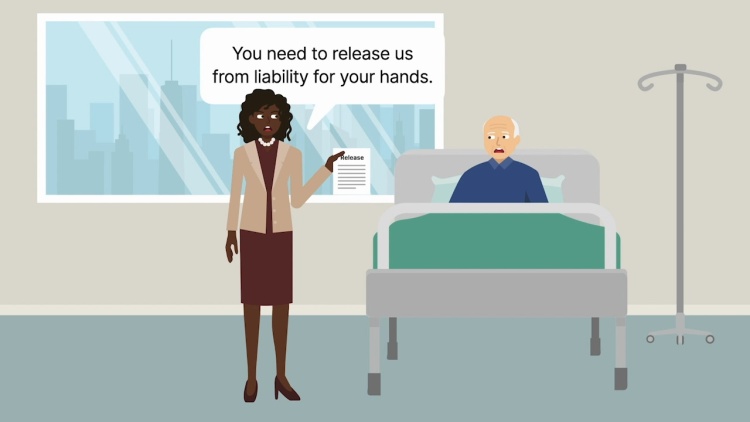Andreini v. Hultgren
Utah Supreme Court
860 P.2d 916 (1993)

- Written by Sean Carroll, JD
Facts
Eugene Andreini (plaintiff) had knee surgery at Holy Cross Hospital (defendant). After the surgery, Andreini experienced “pins and needles” and atrophy of his hands. The doctors did not give him a cause prior to his discharge. Andreini then saw another doctor, who diagnosed Andreini with compression paralysis of his hands. Dr. David Beck (plaintiff), who had performed Andreini’s knee surgery, stated that Andreini would need surgery to fix his hands but that the surgery would completely restore the hands. About a week before the second surgery, an independent nurse hypothesized that Andreini’s condition could have been caused by improper strapping of his hands during the knee surgery. About a half hour prior to the hand surgery, after Andreini was in a gown and prepped, an employee asked him to sign a form that would release Holy Cross from all further liability. Beck told Andreini that he would not operate on the hands unless Andreini signed the form. Andreini’s hands had been getting progressively worse. Given his options, Andreini, visibly upset, signed the form. The operation did not succeed, and Andreini lost most of his hands’ dexterity. Andreini sued Beck and the hospital. Andreini argued that he had signed the release form under duress. The trial court granted the defendants summary judgment, finding as a matter of law that Andreini had not signed the form under duress. Andreini appealed.
Rule of Law
Issue
Holding and Reasoning (Zimmerman, J.)
What to do next…
Here's why 907,000 law students have relied on our case briefs:
- Written by law professors and practitioners, not other law students. 47,100 briefs, keyed to 996 casebooks. Top-notch customer support.
- The right amount of information, includes the facts, issues, rule of law, holding and reasoning, and any concurrences and dissents.
- Access in your classes, works on your mobile and tablet. Massive library of related video lessons and high quality multiple-choice questions.
- Easy to use, uniform format for every case brief. Written in plain English, not in legalese. Our briefs summarize and simplify; they don’t just repeat the court’s language.





